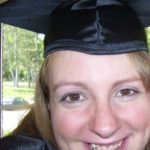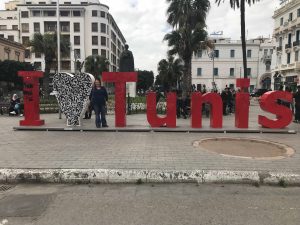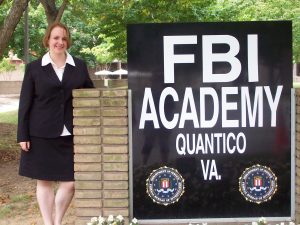Hello!
My name is Anna Spears and I graduated from Denison in 2007 with my BA in creative writing. When I first started college, I wasn’t sure what was on the horizon for me. I toyed with going pre-law, and considered political science or history…. But I ended up just taking the classes that interested me and following a passion of mine: creative writing.
I learned so much about writing at Denison. And what I didn’t realize at the time is that Denisonwas exposing me to a much more diverse world than the one I had known before – full of new ideas, different ways of thinking, and new skills in critical thinking and communicating. My creative writing degree instilled in me different ways to understand and analyze written words, voice, and points of view. I learned technical and creative nuance, world-building, character sketches… All of this would end up giving me an edge when I was hired by the FBI as an Intelligence Analyst in 2008.



I had heard about a career fair hosted at another university from the career center at Denison, where the FBI booth caught my attention. I had wondered about a career in government, specifically national security. The recruiter and I talked about my educational background, and she encouraged me to check the site for an upcoming Intelligence Analyst posting.
In my interview, I was able to tout my exposure to different media sources, understanding of current events, skills I learned in Arabic classes at Denison, and perhaps most valuable – my ability to write and to think critically. I was hired, completed the background process, and was sent to the FBI HQ Counterterrorism Division, where I was assigned to a tactical unit working international terrorism in Africa. While there, I had the opportunity to support several initiatives and investigations across Africa, before ultimately settling in as a subject matter expert on counterterrorism in North Africa.
My work was rewarded with assignments overseas – the US Embassy in Algiers, a military unit in Germany, and liaison/interagency meetings in various countries.
There was one common thread in my work – writing. I would be tasked with writing papers for management and for Director’s briefings. I wrote talking points for high-ranking officials. I received many compliments and even several awards based upon my writing skills and production levels.
I was able to further narrow my expertise and research as time went on and was recognized as a senior analyst on Tunisia. I ended up working at the Embassy in Tunis, where for a time I was the sole FBI employee/highest ranking Department of Justice employee in the country. Slightly above my pay grade, but you learn rather quickly in government to just go with it. Upon completion of my assignment and the hiring of full-time personnel for the office by HQ, I was then tasked with developing a series of tailored intelligence analysis and writing classes for a national counterterrorism center in Tunisia.
I returned to DC and slid into a strategic role where I was able to design the training classes and further hone my research interests. I approached the training classes using what I had been taught in the FBI, but further used skills and ideas that were engrained in me by Denison. Afterall, what is knowing your terror suspect if not through a character study? How do we use the best terms to convey what we want to say efficiently? How do we do all of this together despite differing laws, languages, cultures, approaches, and personalities? Thankfully I was able to work with amazing Language Analysts and translators – they were key to our program’s success.
I left the FBI after 11 years and 1 month. I had been fortunate enough toward the end of my career to focus my research on a subject I’m very passionate about – women in extremism. It’s research I continue to this day. And of course, what kind of writer would I be if I wasn’t working on a poetry collection to process it all? I am very lucky to have had the experiences and opportunities I had with the Bureau. It gave me strength, confidence, some of my closest friends, and a ridiculous number of wild stories. And it wouldn’t have been possible without my experiences at Denison.
The tips I have for anyone interested in an Intelligence Community career:
- Build and maintain ALL the relationships. On your team, in your agency, in other
agencies, and any other capacity that may arise. Genuine relationships, free of
professional jealousies or rivalries create nothing but positive opportunities and can
even further a shared mission faster. - Be open to new/other ideas and perspectives. The Intelligence Community does very impactful, challenging, and tough work. Consequently, they expect maturity and an apolitical stance every day you come to work. Pay close attention to the laws and policies in place.
- Do NOT hoard information. In an intelligence and law enforcement world, information is currency. Share what you have with others, and remarkable things happen!
- HONESTY in ALL THINGS. No exceptions. In interviews, meetings, forms, etc. Be painfully honest. Even (especially!) if you’re worried it will reflect poorly on you or can wreck your career.
Contact Information:
Anna.M.Spears@gmail.com
https://www.linkedin.com/in/anna-spears-ams

